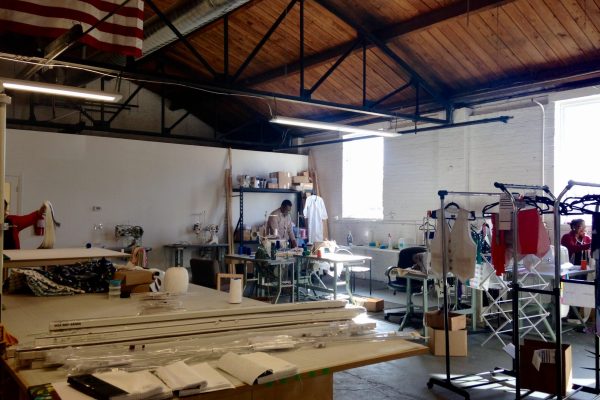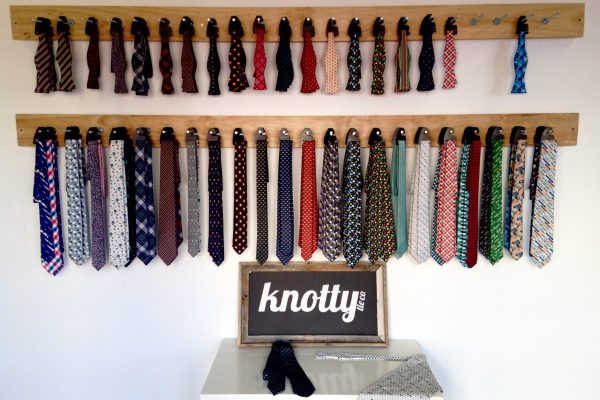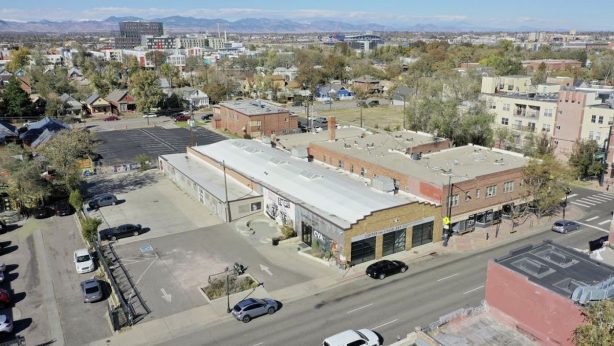New ULC Tenant is Changing the Game, One Tie at a Time
Tucked away in an unassuming auto garage – turned – fabric design warehouse within ULC’s Santa Fe Ten property sits Knotty Tie. Housed inside is a group of less than twenty likeminded thinkers who can fully design, manufacture and print custom made ties, bow ties and scarves in just a few short hours.
When you first walk into the white on white walled warehouse, you’re confronted with a montage of ties, a group of hardworking graphic designers and an open space floor plan of almost 5,000 square feet. And yet something feels different, and that’s when Knotty Tie co-founder Jeremy Priest explained the backbone of the entire business model: to hire past refugees and offer them a realistic and livable wage.
The beginning is your quintessential story of friends who met in college, hoping to create a sustainable business model that benefits past refugees coming to the United States. Meet Jeremy Priest and Mark Johnson. The two met at Metro State in Colorado and utilized their respective business and entrepreneurship skills to create what is now Knotty Tie. According to Priest, the goal was to change the way people think about ties.
“We used a lot of language around trying to disassociate ties from corporate drudgery…for us that meant making them meaningful by ethically manufacturing them and by making them totally customizable.”
Their idea originated from an alternative spring break trip that Priest took his senior year of college. He noticed that while refugees tended to receive initial support upon replacement, the aid eventually fizzled out. He also felt that many had skills way beyond the jobs they often received in the States, such as lengthy night shifts that separated them from their families.
“I was blown away by how many actually had practical skills for which there really should be employment opportunities,” Priest explained. “I talked to Mark about it and we decided to create our own tie company that would basically be able to employee them.”

Queue two twenty-somethings with a newly incorporated business, $500 and an Ikea sewing machine. After two months of working from Priest’s kitchen table, they launched a Kickstarter campaign in March to raise an initial $5,000. Little did they know that their idea would attract donors to fund the company over $24,000 in a few short months.
The next nine months depicted the ups and downs of launching a small business with big dreams. They spent their Kickstarter proceeds toward building a model that allowed customers to pick a preset pattern, color and measurements for a personally designed tie. Of the 10,000 ties created online, only 10 people made an actual purchase.
“People don’t want a technological interface, they just need access to the skills to help them make their vision a reality,” Priest said. “So this is when we got into offering the custom design services.”
Now, only three years later, Knotty Tie is a world away form cheap sewing machines and a minimalistic staff size. In 2015 alone, they sold over 20,000 scarves, ties and bow ties combined. And what started as a business model to hire past refugees and offer them a livable wage was now a reality. A series of investments in 2014 allowed them to make their first two hires that May. The staff practically doubled with the addition of Bems Namugoya and Imad Abbood.
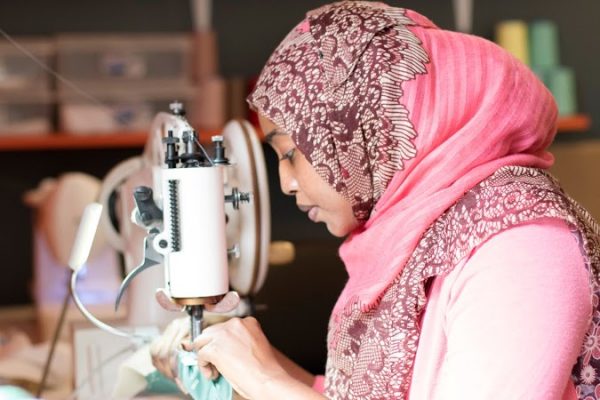
“When they took over production, we took over business development and the website, and that is when our business really started to grow rapidly,” Priest said.
Knotty Tie now employees nine refugees, which is equivalent to half of their staff. One of these employees is Mark Munyakabuga. Originally from the Congo, Munyakabuga spent almost twenty years living in a refugee camp in Rwanda. He taught sewing in the camp, which made him a perfect fit for employment at Knotty Tie. Munyakabuga has been in the States now for almost two years, and said he and his family are very happy.
“The country is very developed, and I have peace in America, I am healthy,” Munyakabuga said. “There is war every day in Africa.”
Munyakabuga has been with Knotty Tie now for eight months and said he is happy working for a company that allows him to support his family and do what he enjoys.
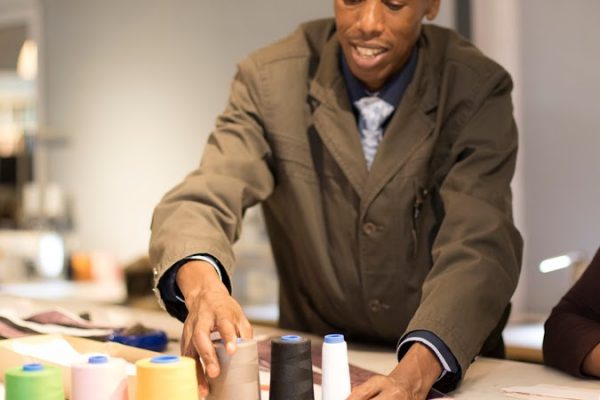
Despite Knotty Tie’s efforts to employee refugees sent to the states, Priest was adamant that with the amount of refugees entering the country each year, more can certainly be done. Each year Colorado sees between 1,500 to 2,000 resettlements annually, while nationally that number reaches 60,000 resettlements each year. And that is just a fraction of the refugee epidemic worldwide.
“Less than one percent of total refugees ever get the opportunity to be resettled in a western nation,” Priest said.
Today Knotty Tie’s employees come from a wide array of areas, including Somalia, Ethiopia, Uganda and Iraq. And now that Priest feels the company has established itself in the custom apparel arena with a stable social mission to boot, Knotty Tie is headed for even bigger and better things. According to Priest, the next three years will see Knotty Tie as the largest American manufacturer of custom goods.
“We will be expanding dramatically,” Priest said. “I would assume [the manufacturing side] of the house will double in size this year…at least.”
With future expansion comes the hope to eventually grow beyond the strictly apparel world where Knotty Tie currently resides. Priest shared his hopes of eventually moving into the homegoods arena, as well as utilizing the company’s current business model but targeting a different skill set. Think the construction of community gardens, or similar types of work that relies heavily on a specific skill set.
Regardless of their next step, it is very clear that Priest and Johnson’s company is making positive waves in the world. With an efficient and successful model, Knotty Tie’s future looks promising.
*Photo Credit
Warehouse: Alana Romans
Entrance: Alana Romans
Group photo: Robert Campbell Photography
Hibo Ali Wehliye: Knotty Tie
Marc Munyakabuga: Knotty Tie

